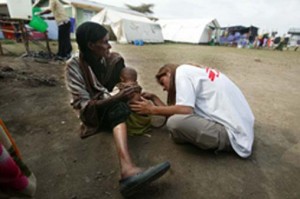
Picture by Juan Carlos Tomasi/MSF
Violence was escalating in the city of Port Harcourt, Nigeria, when Seattle-based operating nurse Louise Fang arrived in early 2007 to start her first of three assignments with Doctors Without Borders/Medecins Sans Frontieres (MSF). Having recently retired from a US veterans’ hospital, Fang would now provide care at an MSF trauma center in the midst of sporadic and deadly outbreaks of fighting among various armed groups that were struggling over power and natural resources prior to elections in the densely populated, oil-rich region.
Created in 1971, MSF is an independent, impartial, humanitarian organization that works in more than 60 countries to provide emergency medical aid to people whose survival is threatened by armed conflict, epidemics, malnutrition, exclusion from health care, or natural disasters. MSF is currently in urgent need of operating room nurses, nurse-midwives, and nurse-anesthetists. It also recruits registered nurses and nurse practitioners.
Fang’s experience provides a glimpse into the work of MSF nurses. In addition to responding to conflict in Port Harcourt, she spent two months delivering maternal health care in Aweil, South Sudan, and three months working in a vaginal fistula repair project in Jigawa, Nigeria. Basic diagnostic equipment and facilities needed to run an operating room were limited, and the scope of responsibility was vast.
In Port Harcourt, Fang remembers one evening when two armed groups were fighting on the city streets. Within four hours the MSF emergency room admitted 30 gunshot victims, five of whom were rushed to the operating room managed by Fang. “That night we operated all night long,” she said. Her main responsibilities included training and managing locally hired staff, maintaining sterile operating rooms and supplies, monitoring patients throughout surgery, and coordinating with the emergency and intensive care units.
In Aweil, South Sudan, Fang was on call 24 hours a day, seven days a week, for a project providing maternal health care as well as surgery in connection with complicated deliveries. The maternal mortality rate in southern Sudan is one of the highest in the world. An absence of healthcare staff, structures, roads, transport, other aid agencies, and investment in health care means that in many areas of southern Sudan, MSF is one of the only medical organizations present to meet the substantial needs. In Fang’s project, there were no scrub nurses, circulating nurses, or sterilization technicians to support her, so she took on these duties in addition to managing the operating room and training staff. The vast majority of MSF’s aid workers are from the communities where the crises are occurring, with ten percent of teams made up of international staff, including more than 200 aid workers from the US in 2008.
“In Aweil, I remember a patient who had placenta previa. The mother was losing a lot of blood. We rushed in, trying to save her and the baby. We finished the surgery after two hours, and both survived. It was very touching when one of the hospital cleaners came to me and thanked me for saving this patient.”
Because of the emergency nature of the work, MSF sometimes asks OR nurses and nurse-anesthetists to depart on very short notice. However, MSF does offer them the option of shorter-than-usual assignments, generally lasting from two to three months or longer. Other types of nurses are required to commit to assignments lasting nine to 12 months. In addition to covering room and board, transportation, vaccinations, and insurance, MSF offers a per diem in the local currency and a monthly stipend. For more information you can visit www.doctorswithoutborders.org/work/field.
Requirements for MSF nurses
- Appropriate diploma, degree, and current license
- Current or recent clinical experience (at least 2 years)
- Teaching/training/supervisory experience
- Flexibility and availability
- Ability to work with an international team
- Ability to work in a low-tech environment
- Excellent communication skills
- Relevant travel
Assets
- Training in tropical medicine, infectious diseases (TB and HIV/AIDS), or public health
- Managerial experience
- Ability to speak French a plus
- Operating room nurses, nurse-midwives, and nurse-anesthetists urgently needed
